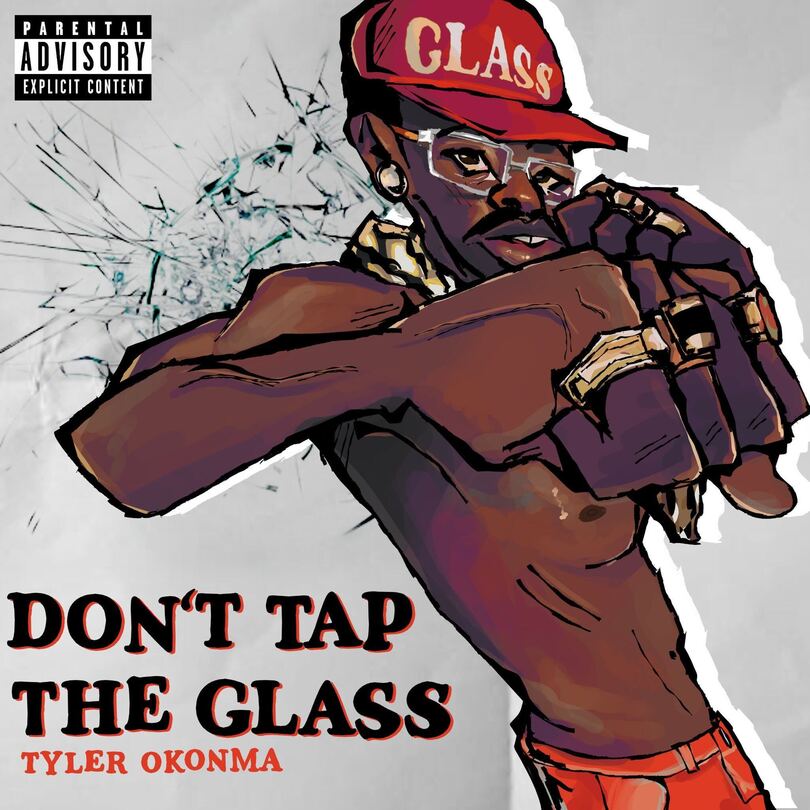Tyler, The Creator pursues danceability in surprise ‘DON’T TAP THE GLASS’ drop

At a listening party to promote his new album, "DON’T TAP THE GLASS,” Tyler, The Creator encouraged his fans to dance to the new music. The album focuses on musicality while incorporating some of Tyler, The Creator’s signature lyrical techniques. Jalyn Cronkrite | Contributing Illustrator
Get the latest Syracuse news delivered right to your inbox.
Subscribe to our newsletter here.
A day before releasing “DON’T TAP THE GLASS,” rapper Tyler, The Creator hosted a listening party for his new album, calling it one of the greatest nights of his life. With no phones and cameras allowed, 300 people were simply dancing and listening to the work, letting the music take them away.
For those who didn’t attend the party, Tyler encouraged them to do the same.
Tyler surprised fans with his ninth studio album on Monday. Though the album’s 28-minute runtime is his shortest yet, “DON’T TAP THE GLASS” is Tyler’s musical mind running free.
The album dives into Tyler’s creative endeavors while also holding a nostalgic touch by incorporating influences from his past albums.
Tyler told his fans to lower their expectations, stating on X that “DON’T TAP THE GLASS” is unlike his more introspective work, instead focusing on the album’s musicality. Considering how the album was recorded during his CHROMAKOPIA tour, the album is Tyler’s creative vision that urgently needed to be fleshed out.
In the album’s first track, “Big Poe,” a droid-like voice introduces the album, stating three rules:
“Number one, body movement / No sitting still / Number two, only speak in glory / Leave your baggage at home / Number three, don’t tap the glass,” the voice says.
By hinting at a more musically-focused album, Tyler encourages listeners to dance to the album rather than dissecting each lyric.
Tyler unveils a ruthless and relentless alter ego, Big Poe, a technique he has used throughout his career. With its antagonistic production and lyrics, the song evokes an aggressive atmosphere from the rapper.

Sophia Burke | Digital Design Director
“Big Poe” features long-time collaborator Pharrell Williams. By featuring Williams, Tyler enhances Big Poe’s persona through his impressive connections.
Tyler momentarily holds back on his bold tone in the sweet and upbeat song “Sucka Free.”
“Sucka Free” offers solid verses about Tyler’s early days chasing success in his hometown of Hawthorne, California, and his present self.
In the first verse about his past, Tyler is often greeted by people, called “suckers,” who stand in his way as he tries to make a name for himself. Tyler admits he’s not bothered by “suckers,” but also wants to prove them wrong.
The melodic chorus repeats the lyrics “I’m that guy, tryna get my paper, baby / I’m that guy for really,” which describes Tyler finally reaching his success. Changing into a whisper, the second verse explores Tyler achieving his success as he tells the “suckers” to spread the word that he’s become “that guy.”
The album returns to its aggressive sound as it hits the fourth and fifth track, “Mommanem” and “Stop Playing With Me.” In these two songs, Tyler is clearly harboring resentment toward an unnamed individual and is itching to express his feelings.
“Mommanem” begins with a plucked string sound and repeated grunts as Tyler builds up the courage to relay his resentment. Tyler is undoubtedly upset, stating that he often offered a shoulder for his friends to cry on, but when it comes to needing help himself, his friends disappear.
Though “Mommanem” is the shortest track on the album, its ominous composition acts as a preemptive taunt toward the individual, an exciting image for listeners to picture as the album reaches its midpoint.
The plucked string carries on in “Stop Playing With Me” as the story progresses. With eerie voices and bullet shots in the background, the song acts as Tyler’s omen toward the individual.
Though the individual was never named, Tyler reveals in the lyrics that he’s addressing a celebrity with a high following who has expressed hatred toward him. In the album’s climax, Tyler’s frustration is evident as he rails on the celebrity, stating that he’s just another hater who is only all talk but has no action.
As Tyler gets into the thick of his rant, he mentions his other relevant associates, like basketball legend Lebron James and his business partner Maverick Carter, to intimidate the individual by once again showing off his famous connections.
In probably the most intense section of the album, Tyler returns to his “Cherry Bomb” roots. The tracks’ sinister production and his ruthless diss, reminds listeners that Tyler, known for his controversial public statements, is one to speak his mind regardless of what anyone thinks.
The seventh track explains the name behind the album. In its first part, “Don’t Tap That Glass,” Tyler reveals a monster is lurking behind the glass. During his July 18 concert at the Barclays Center, he unveiled an art installation of a cartoonish Tyler encased in a glass box, implying that Tyler is referencing himself as the monster.
While there’ve been several interpretations of the album name, I believe “Don’t Tap That Glass/ Tweakin’” acts as a tool to elicit listeners into touching the glass in order to provoke the monster in it. With the album so far leaning on a more angrier tone, Tyler, as the abrasive monster, wants to be set free.
Though “Don’t Tap That Glass/ Tweakin’” isn’t my favorite track, it goes back to Tyler’s original arrangement style: he connects two different songs into one, bridged together by a soft and gentle melody. He broke this decade-long tradition in his previous album, “CHROMAKOPIA.”
As the album heads toward its last three tracks, it emulates a more mainstream, palatable sound, reminiscent of Tyler’s R&B “Flower Boy” album. This was best showcased through my favorite song of the album, “I’ll Take Care of You,” featuring singer Yebba.
The track starts off with a soothing keys tune as Yebba repeats the lyric “I’ll take care of you” in an angelic voice as samples of Crime Mob’s “Knuck If You Buck” slowly fade in to create momentum before the beat. Finally, a jungle beat drops with Yebba’s enchanting vocals layered over it, emulating a dreamscape sound.
After Tyler’s previous visceral tracks, the second-to-last song of the album acts as a solace after his confessions and disses. While its lyrics lack any real depth, the track is an explosion of soul, heart and most importantly, the need to dance.
The album concludes with “Tell Me What It Is,” Tyler’s search for real love. In maybe his most vulnerable song yet, Tyler is tired of superficial love.
“Mama, I’m a millionaire / But I’m feelin’ like a bum / I can buy the galaxy / But can’t afford to look for love,” Tyler sings as he looks toward his mother for the answer.
In a full circle moment, the song ends with the droid-like voice returning, thanking listeners for tuning in to the album.
Whether fans dance to Tyler’s head-bashing rap or his smooth R&B tunes, “DON’T TAP THE GLASS” serves as the perfect blend of two halves to appease a wide variety of music lovers.
Though the album was designed to get fans on their feet, it’s rather a testament to Tyler’s musical genius that makes him one of the most talented and popular rappers today.






